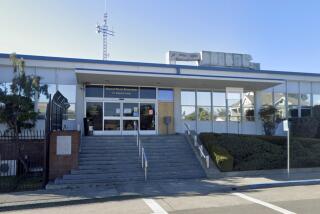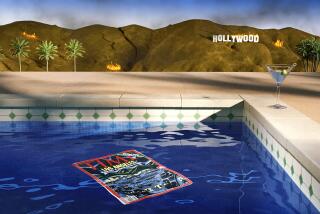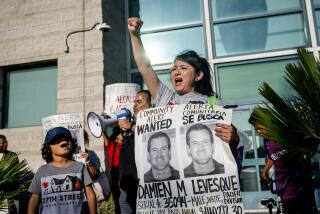Relatives of People Slain by Police Demand Aggressive Probes
- Share via
With the Los Angeles Police Department’s Rampart Division scandal as a backdrop, more than two dozen relatives of men and women killed by police in Southern California joined Tuesday to express their misery and a demand that authorities aggressively investigate excessive force allegations against those who wear a badge.
“We are here to hear from the families of young men and women who have been murdered by the police with no retribution or justice,” the Rev. Richard Byrd of Christ Unity Center told reporters at the ACLU’s Los Angeles headquarters.
For more than an hour, speaking with fury and with tears, the mothers, fathers, sisters and brothers of those killed by local law enforcement officers this past decade shared wrenching stories of their losses. Most, but not all, of the speakers were of color and had lost loved ones in police shootings.
But Paul Hayward’s story did not fit that pattern--his son, David, died in 1994 after he was subdued by Riverside police officers using a neck hold. And unlike many at the news conference Tuesday, Hayward and his family were no longer waiting for their day in court. A federal jury in June awarded them $715,000 after deciding that police had violated David Hayward’s civil rights.
“You can win, you can make a difference,” Paul Hayward said, “[but] you have to fight.”
That call to activism was the central theme of the news conference, timed to coincide with the release of “Stolen Lives,” a purported documentation by the National Lawyers Guild and other groups of about 2,000 questionable police shootings nationwide.
Constance Flaum, whose son Michael William Arnold was shot 106 times by law enforcement officers in Hawthorne last year, said she was among those who once believed questionable shootings by police were too rare to warrant concern.
“Less than two years ago, I would have been . . . sitting on my couch, comfortable and secure and watching this [news conference] on television, feeling a moment of anger, a moment of shock, a moment of sympathy--but feeling absolutely confident that this doesn’t happen to people like us,” Flaum said.
“What I have learned,” she said, flanked by her weeping daughter and relatives of other shooting victims, “is that my son and their children are not the exception. They have become the rule.”
Several times, speakers were careful to note that their criticism of some police actions was not meant as a blanket indictment of law enforcement.
“Not every police officer is brutal,” said ACLU Executive Director Ramona Ripston. “Not every officer shoots and kills.”
But questionable shootings, she argued, are increasing in frequency.
Moreover, she and others claimed, the silence of officers who know about wrongdoing cannot be excused.
Said Byrd: “For all of those good cops out there, you are not good unless you are speaking out for justice.
“If you maintain the code of silence,” he said, “you are just like the shooter, in the same way you would prosecute me if I was with someone who shot.”
The news conference was timed to draw attention not only to the release of the book, but also the so-called National Day of Protest against police brutality on Oct. 22.
Notwithstanding the reasons for the event, it was clearly deemed newsworthy by virtue of the Rampart Division controversy, the LAPD’s most serious misconduct scandal in half a century.
“We have all heard very, very sad stories today,” Ripston said. “And what is also sad is that if we had had this press conference two months ago, you would not have been here. The reason you are here today is because of recent events . . . at Rampart.”
More to Read
Sign up for Essential California
The most important California stories and recommendations in your inbox every morning.
You may occasionally receive promotional content from the Los Angeles Times.










